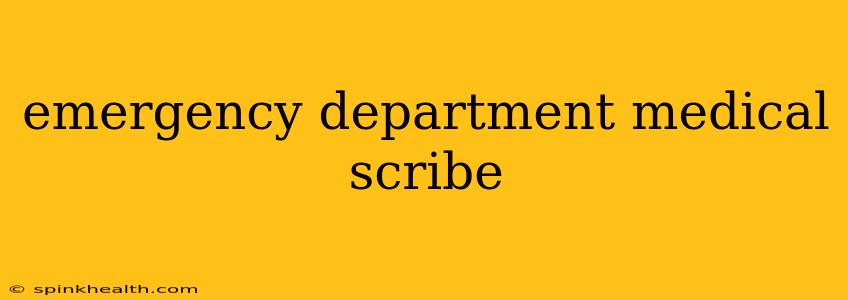The emergency department (ED) is a whirlwind of activity, a high-stakes environment where seconds count. Amidst the chaos, the emergency department medical scribe plays a crucial, often unseen, role. They're the unsung heroes who help physicians document patient encounters, freeing up valuable time for direct patient care and ultimately improving the overall efficiency of the ED. But what exactly does an ED medical scribe do? Let's delve into this dynamic career path.
Imagine this: a frantic scene unfolds in the ED. A patient arrives with chest pains, another with a severe head injury, and a third with a complex medical history. The attending physician is juggling multiple patients, ordering tests, making critical decisions, and, simultaneously, meticulously documenting every detail in the electronic health record (EHR). This is where the ED medical scribe steps in. They're the physician's right hand, capturing the critical information in real-time, allowing the doctor to focus on what matters most: the patient.
What Does an Emergency Department Medical Scribe Do?
An ED medical scribe's primary responsibility is to accurately and efficiently document patient encounters. This includes recording the patient's history, physical exam findings, diagnostic test results, procedures performed, physician orders, and the overall plan of care. It's about capturing the essence of the interaction between the physician and the patient, translating the clinical narrative into clear, concise, and compliant medical records. This allows physicians to spend less time on documentation and more time on patient care.
What are the Benefits of Working as an Emergency Department Medical Scribe?
The benefits of being an ED medical scribe extend far beyond a paycheck. This is a career that offers unparalleled exposure to the fast-paced world of emergency medicine, providing invaluable experience for aspiring healthcare professionals.
- Exposure to a Wide Range of Medical Cases: You'll witness a diverse spectrum of medical conditions, from minor injuries to life-threatening emergencies, significantly broadening your medical knowledge.
- Hands-On Learning Experience: It's a unique opportunity to learn from experienced physicians, observing their clinical decision-making process firsthand. You'll gain a deep understanding of medical terminology, diagnostic procedures, and treatment plans.
- Skill Development: The role enhances your medical vocabulary, improves your typing speed and accuracy, and strengthens your ability to work under pressure, all highly transferable skills.
- Career Advancement: Many medical scribes use this experience as a stepping stone towards medical school, physician assistant programs, nursing, or other healthcare professions.
How Much Does an Emergency Department Medical Scribe Make?
The salary of an ED medical scribe can vary depending on factors such as location, experience, and the healthcare facility. However, it generally provides a competitive income, particularly considering the potential for career advancement. Researching salary ranges in your specific region will provide a more accurate estimate.
What are the Requirements to Become an Emergency Department Medical Scribe?
While formal qualifications vary, most employers prefer candidates with:
- Strong academic record: A high school diploma or equivalent is usually required, often with a focus on science courses.
- Excellent communication skills: You'll need to effectively interact with physicians and patients, ensuring accurate information transfer.
- Exceptional typing skills: Speed and accuracy are paramount in this fast-paced environment.
- Medical Terminology Knowledge: A basic understanding is advantageous, although on-the-job training is usually provided.
Is Medical Scribing a Good Career Path?
Whether medical scribing is a good career path depends on your individual goals and aspirations. However, for individuals interested in medicine and healthcare who thrive in fast-paced environments, it offers an excellent opportunity to gain valuable experience and knowledge while earning a competitive salary. The exposure to diverse medical cases and the hands-on learning experience are invaluable assets for anyone considering a career in healthcare.
What are the challenges of being a medical scribe?
The high-pressure environment of the ED presents unique challenges. The constant flow of patients, the need for rapid and accurate documentation, and the emotional toll of witnessing traumatic events can be demanding. Strong organizational skills, the ability to handle stress effectively, and a resilient attitude are crucial for success.
This journey as an ED medical scribe is not just about documenting medical encounters; it’s about contributing to efficient patient care, gaining invaluable experience, and potentially paving the way for a fulfilling career in the medical field. It's a dynamic role with significant rewards for those who embrace the challenge.

